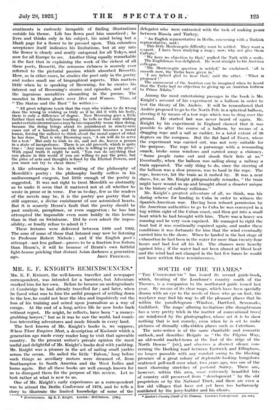MR. E. F. KNIGHT'S REMINISCENCES.*
MR. E. F. KNIGHT, the well-known traveller and newspaper correspondent, was intended for a barrister, but Adventure marked him for her own. Before he became an undergraduate lit Cambridge he had already travelled far ; and later, when he faced what was to him the awful prospect of settling down to the law, he could not bear the idea and impulsively cut the loss of his training and seized upon journalism as a way of escape. At the end of a long, active life he now looks back without regret. He might, he reflects, have been " a money- grubbing lawyer," but as it was he saw the world, had count- less interesting adventures and made friends in every land.
The best known of Mr. Knight's books is, we suppose, "Where Three Empires Meet, a description of Kashmir which a generation ago made every reader long to visit that agreeable country. In the present writer's private opinion the most useful and delightful of Mr. Knight's books deal with yachting. Mr. Knight was a pioneer in the art of sailing small yachts across the ocean. He sailed the little ' Falcon,' long before such things as auxiliary motors were dreamed of, from Southampton to South America and the West Indies and home again. But all these books are well enough known for us to disregard them fOr the purpose of this review. Let us look rather at what is new to us.
One of Mr. Knight's early experiences as a correspondent was to attend the Berlin Conference of 1878, and he tells a story to illustrate the limited knowledge of some of the
* Reminiscences. By E. F. Knight, London: Hutchinson, [188.1 delegates who were entrusted with the tusk of making pew between Russia and Turkey.
" An English. representative in Berlin, conversing with a Turkish representative,. said :
' This little Montenegrin difficulty must be settled. They want a
seaport. I have been studying a map ; now, why not give them Cattaro.'
We have no objection to that,' replied the Turk with a smile. The Englishman was delighted. He went straight to his Austrian colleague. The Montenegrin question is settled,' he exclaimed, ' all is smooth now, the Turks have given in.' am indeed glad to hear that,' said the other. ' What is proposed ? '
The amusement of the Austrian can be imagined when he heard that the Turks had no objection to giving. up an Austrian fortress to Prince Nikita."
Among the most entertaining passages in the book is Mr. Knight's account of his experiment in a balloon in order to
test the theory of Dr. Andree. will be remembered that Andree proposed to go to the North Pole in a spherical balloon, steering it by means of a tow rope which was to drag over the ground. He started but was never heard of again. Mr. Knight by his experiment in England showed that it was possible to alter the course of a balloon, by means of a dragging rope and a sail as rudder, to •a total extent of :10 degrees on the compass. But the flat land of Essex, where the experiment was carried out, was not very suitable for the purpose. The rope hit a parsonage with a resounding smack, broke some windows and carried away a chimney. " Some people came out and shook their fists at us." Eventually, when the balloon was sailing along a railway a train appeared. The only thing to do, since the steering of the balloon was a slow process, was to haul in the rope. The rope, however, hit the train as it rushed by. It was a near shave, for, as Mr. Knight phlegmatically remarks, " the train might have wound us up and brought about a disaster unique in the history of railway collisions."
Mr. Knight's greatest adventure of all, we think, was his daring scheme for landing in Cuba in order to witness the Spanish-American war. Having been refused permission by the American authorities to go to Cuba he was conveyed in a tug within sight of the Cuban coast, and then got into a small boat which he had brought with him. There was a heavy sea running and he very soon capsized. He managed to right the boat but it was continually capsized again, and under these conditions it was fortunate for Win that the wind eventually carried him to the shore. When lie landed in the last stage of exhaustion he liad been in the water for more than twenty-four hours and had lost all his kit. The chances were heavily against him ; if the water had not been almost at blood heat and the wind had not changed in the last few hours he would not have written these reminiscences:






































 Previous page
Previous page